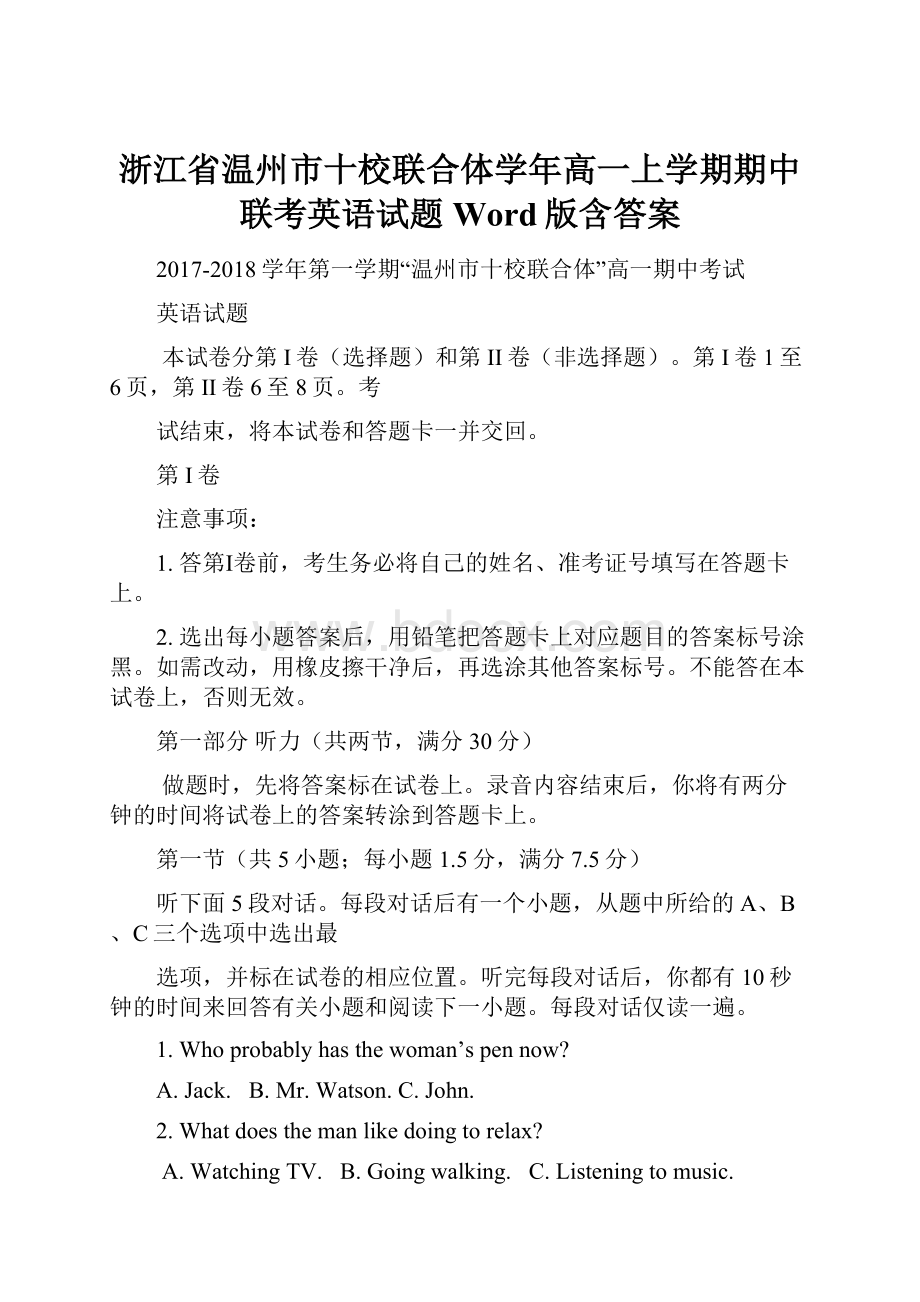浙江省温州市十校联合体学年高一上学期期中联考英语试题 Word版含答案.docx
《浙江省温州市十校联合体学年高一上学期期中联考英语试题 Word版含答案.docx》由会员分享,可在线阅读,更多相关《浙江省温州市十校联合体学年高一上学期期中联考英语试题 Word版含答案.docx(18页珍藏版)》请在冰豆网上搜索。

浙江省温州市十校联合体学年高一上学期期中联考英语试题Word版含答案
2017-2018学年第一学期“温州市十校联合体”高一期中考试
英语试题
本试卷分第I卷(选择题)和第II卷(非选择题)。
第I卷1至6页,第II卷6至8页。
考
试结束,将本试卷和答题卡一并交回。
第I卷
注意事项:
1.答第Ⅰ卷前,考生务必将自己的姓名、准考证号填写在答题卡上。
2.选出每小题答案后,用铅笔把答题卡上对应题目的答案标号涂黑。
如需改动,用橡皮擦干净后,再选涂其他答案标号。
不能答在本试卷上,否则无效。
第一部分听力(共两节,满分30分)
做题时,先将答案标在试卷上。
录音内容结束后,你将有两分钟的时间将试卷上的答案转涂到答题卡上。
第一节(共5小题;每小题1.5分,满分7.5分)
听下面5段对话。
每段对话后有一个小题,从题中所给的A、B、C三个选项中选出最
选项,并标在试卷的相应位置。
听完每段对话后,你都有10秒钟的时间来回答有关小题和阅读下一小题。
每段对话仅读一遍。
1.Whoprobablyhasthewoman’spennow?
A.Jack.B.Mr.Watson.C.John.
2.Whatdoesthemanlikedoingtorelax?
A.WatchingTV.B.Goingwalking.C.Listeningtomusic.
3.Whatdoesthemanmean?
A.Heisunabletogivehelp.
B.Hewillcarrytheboxeslater.
C.Herefusestopayforboxes.
4.Wherewillthemanprobablygoforhisholiday?
A.ToSouthAmerica.B.ToEurope.C.ToAfrica.
5.Whatdoweknowabouttheman?
A.Hehasdifficultywakingup.
B.Helikescollectingclocks.
C.Hegetsuplateeveryday.
第二节(共15小题;每小题1.5分,满分22.5分)
听下面5段对话或独白。
每段对话或独白后有几个小题,从题中所给的A、B、C三个选
项中选出最佳选项,并标在试卷的相应位置。
听每段对话或独白前,你将有时间阅读各个小题,每小题5秒钟;听完后,各小题将给出5秒钟的作答时间。
每段对话或独白读两遍。
听第6段材料,回答第6至7题。
6.WhoisFreckles?
A.Theboy’sbrother.B.Theboy’sdog.C.Theboy’sbestfriend.
7.Whatdoweknowabouttheboy’sfather?
A.Heisalwaysbusywithwork.
B.Heisagardener.
C.Hestaysathomealot.
听第7段材料,回答第8至10题。
8.Whatdidthewomandreamabout?
A.Themanwasleavinghisjob.
B.Themanhadanaccident.
C.Thebosswantedtofiretheman.
9.Whatistherelationshipbetweenthespeakers?
A.Co-workers.B.Husbandandwife.C.Classmates.
10.Whatdoesthemanthinkthewoman’sdreammeans?
A.Thewomanisconcernedabouthim.
B.Thewomandoesn’tlikeherjobthere.
C.Neitherofthemlikethejobthere.
听第8段材料,回答第11至13题。
11.Whatarethespeakersdiscussing?
A.Ashoppinglist.B.Aneveningparty.C.Aweekendplan.
12.Whatdoesthemansuggestdoing?
A.Goingshopping.B.Stayathome.C.Takingalongwalkinthepark.
13.Whatwillthespeakersdonext?
A.Packup.B.Havedinner.C.Gototheconcert.
听第9段材料,回答第14至17题。
14.WhereareKateandTom?
A.InKate’soffice.B.InTom’shouse.C.Inaclassroom.
15.WhydidTomcomeintotheroom?
A.Heworkedthere.
B.HewantedtotalktoKate.
C.Hewantedtohavealettertyped.
16.WhatwasJanedoingatthattime?
A.Shewastakingarest.
B.Shewaspreparingforanexam.
C.Shewastakinganexam.
17.WhatwillKatedonextyear?
A.GotoJapan.B.Changeherjob.C.Gotonightschool.
听第10段材料,回答第18至20题。
18.Whatisthehighesttemperatureontheweekend?
A.15。
C.B.20。
C.C.26。
C.
19.WhatwilltheweatherbelikeonSundaynight?
A.Sunny.B.Rainy.C.Cloudy.
20.Whenwillbethebesttimetogotobeach?
A.Thisweekend.B.Beforesummerends.C.Nextweekend.
第二部分:
阅读理解(共两节,满分35分)
第一节(共10个小题,每小题2.5分,满分25分)
阅读下列短文,从每题所给的A、B、C和D四个选项中,选出最佳选项,并在答题卡
将该项涂黑。
A
TheUSwillhaveanewpresidentthisfall.VoterswilldecidebetweentheDemocraticcandidate(候选人),HillaryClinton,andDonaldTrumpoftheRepublicans.
ButthevotingisnotamustforeachpersonintheUS.Soquitealotofpeoplechoosenottovote(投票),especiallytheyounggeneration.AccordingtoFoxNews,one-in-fiveyoungvotersbetweentheagesof18and35saidclearlythattheywouldn’tvoteforeitherofthetwocandidates.Just12percentofvotersaged35-54,andonlyninepercentofvotersaged55andoldersaidthesamething.
Thisisnotonlybecauseyoungpeopledon’tlikeClintonorTrump,accordingtotheFortunemagazine.Thetruthisthattheyaretraditionallylesslikelytovotethantheirparents.
“Youngpeoplearenotatanageintheirlifewhentheythinkpoliticsorgovernmenthasanythingtodowiththem,”saidRoddFreitag,apoliticalscienceprofessorattheUniversityofWisconsin-EauClaire,US.“Butfortheolderagegroups,theyhaveahome,theypaytaxes(税),theycareaboutschoolsandthecommunity.”
Manybelievethatthecivic(公民的)educationofanAmericanyouthisanotherreasonwhytheydon’tvote.
Studentsusuallyjustdocommunityserviceslikecleaningtheneighborhoods.Thismeanstheyhaven’tlearnedhowtolinkreallifeproblemstopoliticsthroughvoting,accordingtoChristopherBeem,apoliticsprofessoratthePennsylvaniaStateUniversity.
Hesaidthecountryneedstohelpyoungpeoplelearnhowtotakepartinpoliticsandgetthemtoseethattheycanmakeadifference.
21.Whatpercentageofyoungvoterswouldn’tgotovote?
A.9percent.B.12percent.C.20percent.D.55percent.
22.AccordingtoRoddFreitag,youngpeoplearelesslikelytovotebecause_____.
A.theydon’tlikeeitherofthecandidates
B.theirparentsdon’tliketovote
C.theydon’tthinkitisapartoftheirlife
D.theyhavenoworkandcarelittleaboutlivingproblems
23.Whichofthefollowingcanbethebesttitleofthepassage?
A.USYoungNotVotingB.USYoungandTheirPresident
C.YoungPeople’sPowerD.VotingfortheNewUSPresident
B
There’sasayingthatgoes,“Ifyouwanttolosefriendsquickly,travelwiththem.”
Ifyoudon’twanttohaveabadexperienceandendupwithabrokenfriendship,herearesometipsyoucanfollowtoreducetheargumentsthatappear.
Dealingwithabadteamplayer.ShanMinyie,astudentatZhejiangUniversity,isgoingtoShanghaiwithtwoofherfriendsnextmonth.Butoneproblemhasalreadypresenteditselflongbeforethey’veevensetout.Oneofthegirlswon’tliftafingertoplantheirtrips,leavingthetasktoShanandtheotherfriend.Shansaidshewillbemorecarefulwhenshepickstravelpartnersnexttime.
Learningtocompromise(妥协).FengYaolinisafreshmanatYunnanUniversity.ShewenttoXinjiangwiththreefriendslastyear.Oneofthegirlsinsistedontakingashowereveryday.Thatmeanswhentheywerecampinganddidn’thavehotwater,therestoftheteamhadtoputupwithhercomplaints(抱怨).ButFengknewbetterthantoturntheproblemintoafight.
“Itwasonlyasmallthing,andwealltriedtounderstand,”saidFeng.“Anditwasn’tallbad.Forexample,whenshecleanedthetablesintherestaurants,shewoulddothesamefortherestofus.Andweweregrateful.”
Dealingwithmoney.HanChenwenttoXiamenwithaclosefriend.Atfirsttheywouldoffertopayforeachother’smeals,butitwasn’tlongbeforetheyfoundtheirsystemdidn’twork.TheirsolutionwastogoDutch.“Ididn’tfeelcomfortableatfirstbecausewenorthernershaveahabitoftreatingourfriendsinsteadofsplitting(分担)thebills,butsoonIrealizeditwasthebestwaytosolvetheargument.”
“It’struethatyougettodiscoversomeofyourfriends’problemsduringthetrip,butinsomewaysitwastheproblemsthatbroughtusevencloser,”saidHanChen.
24.Inparagraph1,bysaying“Ifyouwanttolosefriendsquickly,travelwiththem”thewritermeans______.
A.pickingtravelpartnersisveryimportant
B.youshouldnotchoosetotravelwithyourfriends
C.Travelingwithfriendsmayleadtobrokenfriendships
D.You’llhaveabadexperienceifyoutravelwithyourfriends
25.Whenyourfriendscomplainduringthetrip,youshould______.
A.helptodiscovertheproblemB.trytobeunderstanding
C.begratefulforeverythingD.justignoretheircomplaints
26.Whatdoestheunderlinedphrase“goDutch”meaninthelastbutoneparagraphmean?
A.payforeachother’smealsB.payforone’sownfoodandbills
C.treatyourfriendstomealsD.solvetheproblemstogether
C
Howcanyouchangenegativethoughts?
Manypeoplesuggestchangingyourattitudebythinkingofsomethingbrightandhappy.
However,scientistsfromQueen’sUniversityinCanadasaidthattheremightbeanotherway:
bywalkinglikeahappyperson.
“Itisnotsurprisingthatourmood(情绪)andthewaywefeelinfluenceshowwewalk,butwewanttoseewhetherthewaywemovealsoinfluenceshowwefeel,”explainedNikolausTroje,theleadscientist,toTheIndependent.
Scientistsbelievedthatthosewhosufferfromdepression(抑郁)remembernegativeinformationfarmoreeasilythanpositivemessages,especiallywhentheinformationisaboutthem.
Inordertoprovethis,Trojeandhisteamusedcamerastoobserve47peoplewalkingonthetreadmill(跑步机).Halfofthepeoplewereencouragedtomimic(模仿)asadwalkingstyle,whiletheotherhalfmovedlikeahappyperson.Walkingspeedwaskeptthesameforbothgroups.
Duringthewalkingtime,thescientistsreadoutalistofpositiveandnegativewords,askingpeopletodecidewhetherornoteachworddescribedthemwell.Afterwards,peoplewereaskedtoreciteasmanyofthewordsastheycouldremember.
Asexpected,thosewhohadbeenmimickingasadwalkthoughtofmorenegativewordsthanthosethathadbeenwalkinginahappyway.
Thisfindingmeansthatourwalkinfluencesthewayweprocessinformation.Andthescientistsbelievethatusingahappywalkingstylecouldhelpwithtreatmentfordepression.
27.Whichofthefollowingisclosestinthemeaningtotheunderlinedword“negative”inthefirstparagraph?
A.sadandinactiveB.angryandstubborn
C.determinedandstraightD.lonelyandboring
28.WhatnewwaydidscientistsfromQueen’sUniversitypossiblyfindtochangenegativethoughts?
A.Doingsomethinghappy.B.Thinkingofsomethingbright.
C.Walkinglikeahappyperson.D.Thinkingaboutbeingahappyperson.
29.Inthetest,thosewhowalkedinahappyway_____.
A.rememberedmorepositivewordsB.rememberedmorenegativewords
C.livedahappierlifeD.livedaharderlife
30.Accordingtothestory,thefindingcanhelp_____.
A.improveone’sactingskillsB.treatpatientswithdepression
C.recoverpeople’s